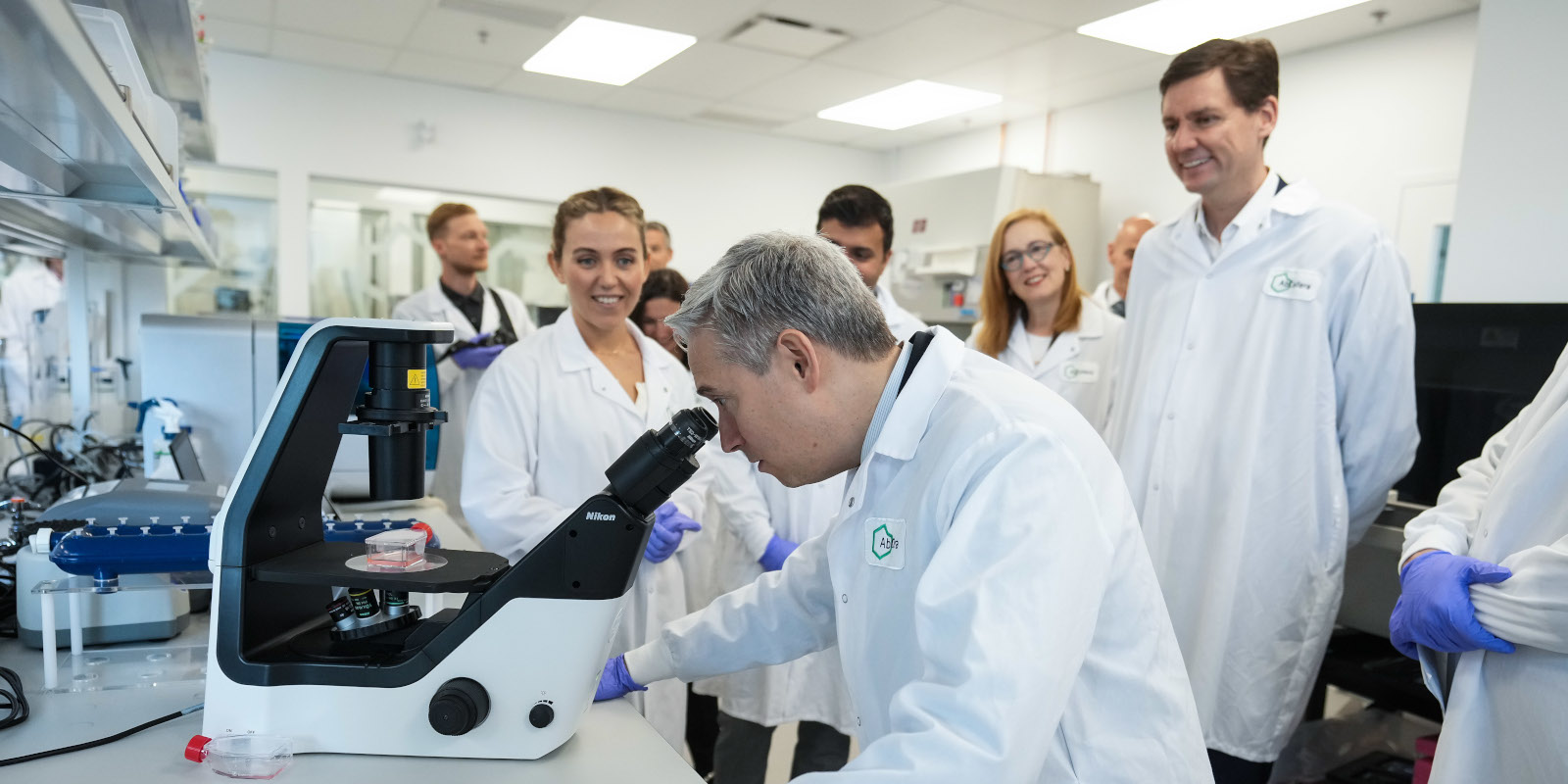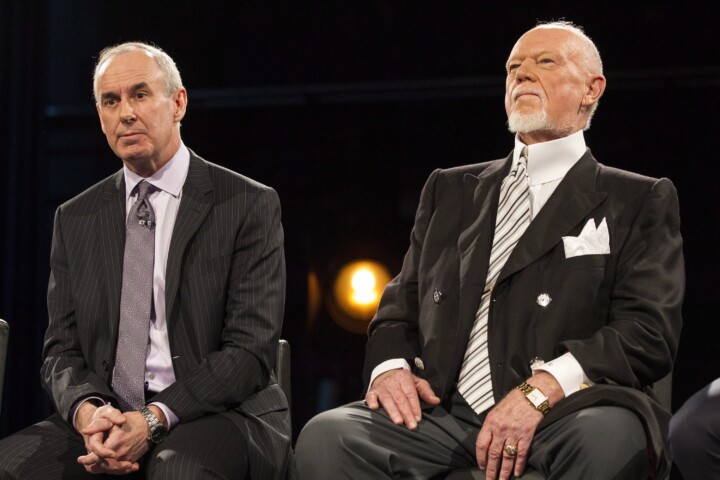This episode of Hub Dialogues features host Sean Speer in conversation with Frédéric Bouchard, the dean of Arts and Sciences at the Université de Montréal and former chair of the Advisory Panel on the Federal Research Support System. They discuss the panel’s 2023 report on improving federal investments in science, research, and innovation and its policy implications.
You can listen to this episode of Hub Dialogues on Acast, Amazon, Apple, Google, and Spotify. The episodes are generously supported by The Ira Gluskin And Maxine Granovsky Gluskin Charitable Foundation and The Linda Frum & Howard Sokolowski Charitable Foundation.

SEAN SPEER: Welcome to Hub Dialogues. I’m your host, Sean Speer, editor-at-large at The Hub. I’m honoured to be joined today by Frédéric Bouchard, the dean of Arts and Sciences at the Université de Montréal and a brilliant thinker about the role of expertise in science in modern society. Last year, he chaired an advisory panel on the federal research support system that reported to the federal government in March 2023 on how to improve federal investments in science, research, and innovation. The report has received wide acclaim for its rigour and advice. I’m grateful to speak with him about the panel’s work, why it’s important to think about funding architecture as much as the dollars, and various other meaty policy issues concerning science, research, and innovation. Frédéric, thanks for joining us, and congratulations on the report.
FRÉDÉRIC BOUCHARD: Thank you, and glad to be here.
SEAN SPEER: I want to start with your own research if that’s okay. You completed your PhD in 2004 at Duke University. Your dissertation is entitled “Evolution, Fitness, and the Struggle for Persistence.” In it, you take on the ambitious task of providing amendments to Darwin’s theory of evolution. I won’t ask you to explain the whole dissertation, which is available online, but talk about how you grew interested in the intersection between science and society and how that work has influenced your leadership on the federal advisory panel.
FRÉDÉRIC BOUCHARD: Basically, I’ve always been interested in both philosophy and sciences, and I didn’t want to choose. In CEGEP, roughly junior college for many of your listeners, I studied natural sciences, some chemistry, physics, biology, and math. But then, for my undergrad and master’s, I went into philosophy. And for my dissertation, again, not wanting to choose, I ended up doing some philosophy of biology, which looks a lot like theoretical biology.
What I was interested in, and still am interested in, is how biologists define and measure evolutionary fitness. So when we say survival of the fittest, well, the fittest what? Are we talking about genes, organisms, species? And how do you measure it? I provide some suggestions on how to improve a lot of biological modeling.
This has taken me through the years to be interested in, well, what does it mean to do interdisciplinary research? And how do people from different fields, how can they talk to each other, and how can they do research projects together? That has gotten me into looking at what is an expert? What is expertise, and what should the role of experts be? What are the legitimate and illegitimate roles of experts in civil society? So that’s my—I’d say in a few sentences, what does a philosopher of science do in 2023?
SEAN SPEER: The terms of reference for the panel really focused on Canada’s, or at least the federal government’s, research funding architecture. You were tasked with providing advice on bringing greater coherence and identifying efficiencies in the model and structure of federal research funding. The report similarly raises issues about fragmentation, duplication, and even gaps. Let’s just set the scene for listeners. Why do these types of institutional questions matter so much, and how can fixing the architecture produce better outcomes?
FRÉDÉRIC BOUCHARD: So, this was a work by a distinguished panel of experts in different fields, in different universities across Canada. Basically, through our individual experiences, we’ve witnessed—most of us have been or still are university administrators, we’ve worked with funding agencies, and we’ve seen international peers. And so, on a more basic level, we think it’s not fully appreciated how important it is for any society to be competitive in research and innovation. In any and all aspects of our lives, of course, we see the impact of discoveries, but I think we underestimate the importance on a day-to-day basis of having a strong research innovation base for any and all countries.
Now, that doesn’t matter so much if other countries aren’t focused on this, right? Because then it just becomes—I mean, we talked about natural selection; if everybody runs slow, you don’t need to run fast. You just need to run slightly faster than the others. But if people are running faster, if your competitors are running faster and faster, you’re in peril if you don’t pick up pace.
And this is not just about dollar amounts. We think it’d be a mistake to just focus on how much money is invested—although that’s a crucial part of the equation—but how do the different investments flow towards the types of research that are necessary for a society to flourish? We’ve seen in the last 20 years, Canada has done a lot of its investments, this should be highlighted across—and this is not a partisan issue—governments of all colours have invested in research innovation but have done so in an architecture that wasn’t designed for collaboration across disciplines, in a structure that wasn’t designed to help mission-driven research of the type that we witnessed through COVID. When there’s an urgent need or opportunity, how do you get your best talents together to answer the call? The system wasn’t designed to support that, and it wasn’t designed to support large-scale international collaborations. We do all of that, but we do that with a system that wasn’t designed to do that. You can take a Toyota Camry down a rocky path and if you’re a good driver, you’ll manage to some extent, but at some point, your neighbour in a Range Rover or a RAV4 will do better than you.
SEAN SPEER: We’ll come back to architecture later in the conversation because it looms large in your recommendations. But before we get there, Frédéric, I want to ask a question that I think has similarly loomed over federal policy since my time in Ottawa. Should university-related research funding prioritize basic research, what’s sometimes called discovery research, or more applied research? How should we think about the research spectrum, and where should the government dedicate its scarce resources?
FRÉDÉRIC BOUCHARD: So that’s a crucial question, and a good philosopher will change the question. But basically, jokes aside, is that, actually, we wanted to step away from the distinction between basic research and applied research because most researchers aren’t actually that segmented, if you will. They’re not that focused on purely basic research or purely applied research. Most discoveries that have a big economic import or a big well-being import started in one place and ended up in the other. It’s not always from basic research to applied research, right? So basically, what we focused on was a distinction between investigator-driven research, where the scientists basically proposed the questions that should be answered and then say, “Well, I’m going to look in that direction,” and that could be basic or applied, versus mission-driven research, where there’s an external need that’s being expressed either by government or community organizations, or civil society, but there’s a need for answers or expertise.
COVID is a classic mission-driven research need. We need a vaccine, or we need new clinical practices. Whereas most Nobel Prizes started out as investigator-driven research. Any and all countries need both. This is—most countries looking back a few decades, overemphasized one or the other. You could see it in their performance. If you just fund applied research, or—at some point—you’re going to be recycling discoveries that have been, or actually, you’re going to license discoveries that were made elsewhere. If you just do basic research, actually, you’re limiting even your potential for discovery because a lot of discoveries are in applications. So you need a balanced approach.
This is why our report focuses on a system-wide approach, saying, “We have really good tools for investigator-driven research; let’s better support it because they’re hurting. We haven’t kept up with competition.” But what we’re lacking are the funding instruments to support, well, interdisciplinary research, we can get into that, but mission-driven research, be it economic, societal, or environmental, we don’t have the right tools to support that kind of research. Most other privileged countries have found ways to support both because they think it’s the only way to support their well-being and prosperity moving forward. So we were tasked with providing recommendations on how to level up, if you will, Canada and research innovation by taking care of the whole system.
SEAN SPEER: Let me ask another big-picture question. The university research model is generally predicated on self-regulation through peer review, but there are increasing questions about whether that self-regulation is actually an impediment to new and different ideas. The well-documented challenges that Katalin Karikó, the researcher credited with conceiving of MNRA, is a good example. Her peers had tremendous influence on her publication and funding and essentially marginalized her because she was doing something different. How can we ensure that researchers are doing rigorous work without limiting them through the bias of preexisting ideas or scholars?
FRÉDÉRIC BOUCHARD: Yeah, I guess I don’t share your assessment. I think overall, if you look on average, the track record of investigator-driven research and peer review has been extremely positive. I think we’re making a different assessment. We’re saying it’s not sufficient or it’s not exhaustive of the types of research that a society needs. So I would not put it in terms of either-or. Should it be—peer review and investigator-driven research has an incredibly good track record in generating prosperity, discovery, and well-being. But I think what we’ve seen is that because there is an ever-increasing role for innovation in our advanced societies, then it’s legitimate for other people to care about innovation as well and not just university professors. And that’s good news for everyone. So once you take that seriously, then you see that you need ways of sustaining a greater diversity of types of projects. For some of them, well, it may be we think peer review should still play an extremely important role, but is it sufficient to support the whole range of research innovation that we need? This is where we think that we need new instruments.
SEAN SPEER: As part of the panel’s work, you carried out a lot of consultation, including with various stakeholders. I recognize that at some level, interested parties can agree on big-picture priorities, like, say, more funding. But below that, there are presumably some fault lines within the research community, including possibly between institutions, research fields, and even among generations. Did you encounter any of those fault lines? And what would you say to the argument, which I also frequently heard in Ottawa, that we “spread the peanut butter too thinly,” that is to say, research dollars ought to be more targeted to certain institutions, fields, or scholars?
FRÉDÉRIC BOUCHARD: Well, I’m skeptical of our ability to pick winners, right? So, putting all of our resources in a few targeted projects assumes that you’re really good at predicting what will succeed or what should succeed. Actually, I think the history of research innovation shows that that’s not—I mean, you may win out every once in a while, but that’s not the way to do it. I think the largest consensus, and this has borne out with our discussions with international peers, is that—and again, this goes beyond the government of the day, this is across for the last two decades at least—we haven’t been ambitious enough. And this is not just government; it’s just all of us have not been ambitious enough about how will we anchor our well-being and prosperity in 20 years, right? And that will take—when you talk about moonshots or when you talk about increasing innovation potential or increasing productivity, increasing the talent base—and I don’t want to—we’ve done great things, but collectively, I think we’ve been a bit complacent because we don’t see how much other countries are being extremely ambitious around research innovation.
Now, people may disagree about the strategy, so in our consultations, they had different strategies. Everybody thinks that, “Oh, if you give me more resources, everything will go better.” But frankly, there weren’t deep disagreements; there were—basically, I think we all recognize, and when I say we, I don’t mean just universities because we talk to industry representatives, community organizations, First People and Indigenous groups.—we talk to a very broad section of stakeholders.
There are universal concerns about the talent base for instance. So do we have enough highly qualified people, and are they competitive? And this is not just in cutting-edge science. A good master’s student who will go into maybe advanced manufacturing is supremely important for that business, right? So a young researcher is essential for the economy, even if he or she doesn’t contribute specifically to research activities, but just because you have a higher-quality talent base.
And so, across the consultations we’ve had, it was clear that there was a concern for the talent base in Canada. We’re good, but the other countries are getting better, and we’re not keeping pace. It’s not just a question of dollars, and this is very important; it’s a question of ambition. But the concern is, focusing, getting back to your peanut butter, the question of spreading the peanut butter too thin actually, is that the question of course is, “Is there enough peanut butter?” Right? So that’s a concern and that’s about resources. But ultimately the question is, “Are we ambitious enough?”
We think we are, but actually, when we talked to a representative from the U.S. government, Germany, France, the U.K., Norway—and I’ll put this bluntly, and I don’t want to put anyone in trouble here, but I asked them whether Canada was a priority research partner, and basically—very politely and diplomatically—what they were saying is no. Because we’re not—they have difficulty—we’re appreciated, we’re respected. So our scientists are highly respected. They want us in collaborations, but they don’t see us as serious or competitive enough in research and innovation to be a priority partner. So we’re privileged partners. That was one of the expressions they used. We’re privileged partners, but we’re looking at the ambition and the resources that other countries have put in the last few years, and we’re lagging. I guess this is why the panel was convened. The government, I think, is taking notice of this vulnerability. But even us—I mean, we work in this field and we were a bit taken aback by the widening gap between Canada and other countries.
SEAN SPEER: We’ll get into your recommendations in a minute, Frédéric, but I want to take up another possible widening gap: and that is the growing distance between universities and the societies that they inhabit. There’s a tendency for scholars to have a degree of attachment from the world that they’re studying and analyzing, but at times that scholarly detachment can seem like aloofness. The risk, it seems to me, is that in a zero-sum world of public finance, taxpayers may come to preference, say, health care over university research. I’ll ask you to respond. How can universities and their faculties better root themselves in the societies and the communities in which they exist?
FRÉDÉRIC BOUCHARD: If you look at the history of universities across decades and centuries in Canada and elsewhere, actually, universities have never been so linked to the societies that they live in. I see this every day as a dean. I have professors working with municipalities to look at their water systems and looking at election systems. So every day, actually, I see academics in the city, if you will. And in a much more— I wouldn’t say—not to give the truth that has been developed on the hill, but actually co-developing problems and solutions with civil society. So I think it’s more a question of perception than reality.
One thing that’s relatively new, though, is that I have more and more professors afraid of giving interviews or going on social media because whatever they’ll say—just like anyone in society, right? There’s this concern that you’re going to get trampled by ideological opponents. I have some professors who used to work with various groups and now are more skittish about doing it because they’re worried that they’re going to get trampled. Whether that’s real or not, that’s a perception on their part.
But on the ground, actually, there has never been more genuine collaboration between industry, community organizations, and academics or university scientists. And this is not—I could lie and say that the Université de Montréal is especially good at this, but actually, this is across Canada. This is a general trend that has been going on. Part of it is that as more diverse sections of society have been able to pursue university education, they’ve come up with the concerns from their communities, right? So whereas a poor kid from Lethbridge maybe 40 years ago wouldn’t have considered a university education. Now, he does, but he comes with his own experience and his family’s experience. What do they think is urgent?
So actually, Canadian universities, I’m not saying we’re perfect, I’m just saying it’s much, much—there are much more collaborations with civil society and the economy than there were decades ago, and it’s accelerating very fast.
SEAN SPEER: Let’s turn now, Frédéric, to the panel’s recommendations. Its marquee recommendation is the creation of a new Canadian Knowledge and Science Foundation. What was the panel’s thinking here? How would such an organization situate itself in the current federal funding architecture? And how would it help to solve for the fragmentation, overlap, and gaps that we talked about earlier?
FRÉDÉRIC BOUCHARD: First, the big gaps that have been identified and the weaknesses for Canada around interdisciplinary research—and that sounds maybe like something that interests only university professors, but actually, it’s really important. If you wanted adaptation to climate change, it will be geographers, hydrologists, engineers, economists, sociologists. So you need that type of interdisciplinary research to answer big challenges. So interdisciplinary research is something that we have difficulty doing in the current setup. Mission-driven research—it can be both national interest and economic, so that’s the DARPA model, if you will, in the United States. But it could be much more on a smaller scale. How will this change in the manufacturing sector affect jobs in this area of the country, for instance? That would be mission-driven research. That’s something we have difficulty doing now as well as international collaborations.
So basically, what we are saying is right now we’ve got some organizations in Canada that support, really well, investigator-driven research that’s more disciplinary, if you will, closer to a single academic discipline. So basically, some people were suggesting, “Oh, well, status quo, but just throw lots of money at it.” And we say, “Well, more money is always nice, but it won’t solve the problems around interdisciplinary, mission-driven, and international collaborations.” One other—let’s say at the other end of the spectrum, is, “Let’s destroy everything and start afresh with a single agency.” Actually, the U.K. has tried that, and even discussing with them, it’s not clear that it gives the benefits that we’re hoping for. It hasn’t reduced administrative burden, but has increased it because you’re trying to fit everything in a single behemoth, right?
So we end up with a recommendation somewhere in between, saying, “Well, let’s have a funding instrument that does what’s missing.” And that way, we don’t disrupt what’s working, right? Which is the funding councils with their focus on investigator-driven research, and, “Let’s have a funding instrument that does what’s missing.” What’s neat is that, actually, most of the, if you will, the staff is already in the system. You already have employees that do a very good job supporting related initiatives. So it’s more a question of how do you reorganize parts of the ecosystem, give it independent oversight, so you make sure that you’re following the ambitions, focused and efficiently? And that’s the foundation that we propose. So it’s using the staffing that’s already in the system, giving it some of the staffing, right? Because it’s a question of making sure the right people are at the right place, doing the right things, and giving it its own oversight so you remain ambitious and rigorous in whether you’re attaining your objectives or not.
SEAN SPEER: When I read the section on the proposed foundation and its role in interdisciplinary and mission-driven research, I thought a bit, Frédéric, about the push-and-pull role that that organization might have. That is to say, it may fund projects that involve researchers or scholars from different areas, from possibly different institutions, who are coming together to come to the foundation. But talk a bit about its role in helping to create those types of interdisciplinary opportunities and identify ideas, scholars, or research where individuals may not be familiar with one another but an organization like that could play a role in bringing them together.
FRÉDÉRIC BOUCHARD: So most mission-driven research is actually interdisciplinary. So just any mission—I mean, there are exceptions, but most missions involve expertise from different fields. So it will be important to—I mean, there will be some urgent missions, and again, COVID is an example, right? Where there’s an urgency to do something. But other missions could be on a longer time frame and announcing it like, “This is a priority area for Canada, and we’re going to launch mission calls for research projects on this,” in itself is a strong—when researchers see that, “Oh, wait, they want to support audacious and innovative projects in this area, I’ve met this prof earlier last year,”—this is how a lot of collaboration works. The launching of mission calls in itself is a strong beacon for professors to think beyond. When I say professors, it’s not just professors: postdocs, and PhD students to think, “Oh, I’ve always wanted to do this, but I’ve never been encouraged to do this.”
Very personally, I’m a philosopher of biology. Most of the time, I work with biologists, not philosophers. It was difficult to get my research funded, right? Just because, well, I’m not philosophy enough, but I’m not biologist enough. And you fall between the cracks.
If you signal either on the interdisciplinary or mission-driven, “Okay, we want that type of project for how to help Canada respond to food security.” And you just say, “This call will be happening every year for the next five years.” Well, the first year, you’ll only have the ones already doing it applying. But then, “Oh, wait, I hadn’t thought about that.” And so I’m not saying it’s purely passive and organic, but we shouldn’t underestimate the power of the beacon. Most researchers actually want to contribute and haven’t been given the opportunity. And I think we need to—I meet a bunch of researchers every day. You’ve got all kinds of types, but many are highly motivated to improve their society in various ways. And they may not find obvious ways of doing it. And in many respects, if we signal ways that they can contribute, many will respond to the call.
SEAN SPEER: You also recommend the creation of a national strategy for science research and innovation to bring greater coherence to government organizations and funding. I understand the rationale, it makes good sense. But to come back to an earlier part of our conversation where we talked about the risk of opportunity costs of projects that don’t proceed or aren’t approved because they don’t fit within existing priorities or knowledge, how can such a strategy leave room for that type of work? How can we avoid the opportunity cost of limiting progress on stuff we don’t currently know about?
FRÉDÉRIC BOUCHARD: Very important. And actually, it’s all in the granularity of the strategy. So the strategy shouldn’t say, “We should focus solely on non-lithium-based batteries.” So that would be too micro in terms of—that’s not a strategy, that’s a tactic, actually, right? So it’s not—the strategy may be, “Well, how do we increase the percentage of PhDs that work in industry?” Right? That would be a higher-level strategy. So we’re thinking more of the latter, but actually, just having these discussions would improve Canada’s standing. Looking at the U.S., looking at Germany, the U.K., France, they do it differently. But basically, research innovation is always on the agenda, right? Not because—and this is important, I say this often: research is not a luxury activity of rich countries. It’s a necessary condition of being an advanced society, right? So most countries have figured out ways to make sure that—among others, it’s not the only one—it’s a national priority, and that you need a way to keep check on it on a regular basis. So the strategy in itself, the content of it, you’re absolutely right that we have to be careful not to fall into the fad of the day; plastics, right? Just plastics. But if you were really ambitious as a country around research innovation, they will be higher-level ambitions, but also it provides a way to coordinate sectorial strategies.
So in the last few years, we’ve got an AI strategy, a quantum strategy, and luckily they’re in the same ministry, right? But let’s say you had a food security strategy and an AI strategy. Well, actually, they do work together because more and more farming will use algorithmic modelling to drive efficiency. But right now, we don’t have the right instruments to say these two committees or whatever should talk to each other. So we don’t have the coordination. So the strategy is more about goals, coordination, and keeping us honest, all of us, right? Are we meeting the key indicators? Are they the right indicators? “Oh, look, South Korea has changed its approach. Is our approach still competitive?” This is the type of thing where you need some sort of higher-level advisory body that makes sure that the ambitions we need to have if we want to ensure our prosperity and well-being are being delivered.
SEAN SPEER: Your comments, Frédéric, remind me about something from my time in Ottawa. That, in hindsight, it seems odd that research funding was often divorced from the government’s broader thinking about its economic agenda. Even in the budget itself, research funding tended to be in a separate chapter from the core economic policies. Why do you think that is? And how have these other countries come to situate science and research funding more centrally in their economic strategies?
FRÉDÉRIC BOUCHARD: Other countries have been more explicit about the role that innovation plays in their economy, but they’ve also been more explicit on how research innovation is important to other national priorities as well. And so this is a relatively recent shift. Before, it was just health or money, right? “Are we saving lives?” “Are we rich enough?” Right? So this was kind of the promise of research was basically, we’re saving lives or we’re creating wealth, and we were devaluing other types of research that actually do sustain, in various ways, well-being. Other countries have basically had much more holistic approaches to research innovation. If you want more efficient government, you will need more social scientists in it using the best type of research to drive efficiencies or productivity gains within government, for instance. So these are whole approach.
So they’ve raised the profile of innovation in the economy more explicitly, but most of them have done so in a way that it wasn’t exclusively an economic file. I think this is why I talk about national ambition and not just economic ambition. This has implications for our political sovereignty, national security, health, mental health, just our well-being, whether it’s a just society. All of these questions depend on a lot of really smart people looking at these questions. They don’t all need to do research, but they need a way of looking at research and seeing what deserves uptake and what does not.
So as a country, we haven’t been ambitious enough for the place that talent and ideas should play in our future well-being. I think we haven’t been committed, and we haven’t shown the follow-through on any and all of the ambitions that we currently have about science. We may not have been focused on economic development, but we weren’t fully committed on discovery as a country, right? And so, right now, I think it’s more a question of, for me, the two things that strike me the most is there is a genuine risk of brain drain in any and all fields. And I don’t just mean in universities; this will have an effect in industries, and in government, because right now, and this is dollars, but we’re not funding our graduate students enough. So the top talent will either drop out of research innovation or go to other countries. And it’s happening right now. So the brain drain explains the urgency of this issue. But the other driver of urgency is that other countries are going all hog in research innovation. The most staggering example is South Korea. South Korea, 20 years ago, you probably hadn’t heard of Samsung, or you may have seen a bad TV. You hadn’t seen LG, Hyundai, Kia, right?
So about 20 years ago, they went all in research innovation, and they went from below OECD expenditures, so investments, and this is all sectors combined, so industry, government. Now, they’re almost top in the world. And if you track their GDP, it tracks almost perfectly. They basically reoriented their economy towards a very research-innovation-intensive economy, and it’s showing dividends. For the same period, Canada has gone down. We’re one of the only G7 countries that has actually diminished in research and innovation investments, most of it from industry. That’s a more complex story to give, but it will have consequences for the Canadian economy.
The other big driver of the urgency is that the U.S., largely around national security and economic sovereignty and the sustainability of its economy, basically adopted the U.S. Chips Act. It’s around semiconductors and chips, but actually, the whole scientific enterprise to basically remain competitive vis-à-vis China. And then it has adopted the Inflation Reduction Act. The Inflation Reduction Act, we focus mainly on the industrial policy part, but, actually, there’s a massive talent part making sure we have the talent pool that can actually sustain and anchor these industries moving forward.
Europe has woken up because of the U.S. There’s this domino. China went big on research and innovation. This has woken the U.S. It’s waking up Europe. And now, if we don’t move and just level up our ambitions, we’re going to be left behind as a country, and this will have economic consequences.
SEAN SPEER: It’s a good segue to my final question. Are you optimistic that the report is finding resonance and will ultimately inform government policy?
FRÉDÉRIC BOUCHARD: I’m fundamentally an optimistic person. And I would say research is intrinsically optimistic because you think if you think hard and work hard, good things will happen, right? So the mere fact that they asked this panel to convene should be a sign that it’s on Ottawa’s radar. I am a bit concerned. I’m not sure that the degree of urgency is fully appreciated across not just government but across Canadian society. And I’m telling you. So it’s nice if you, your listeners, or people in Ottawa say, “These are important issues; we want to address them. But this is not the right time; we’ll get back to you later.” But actually, this will have genuine consequences for the well-being and prosperity of Canadians because we cannot—in 20 years, we’ll either be consumers of innovation produced elsewhere or we’ll be producers of innovation, and I’d rather be on the producing end. It’ll help me consume other things, right? But we cannot just be consumers of research innovation. It doesn’t work, and we’re not going to be competitive, and we’ll have difficulty paying for it. And so I would strike the urgency, and this is where I feel genuine interest and, I’d say, desire to move on this file. What I’m waiting for, and maybe it’s there but I just haven’t heard it, is whether they appreciate, whether we all appreciate, that we need to move fast on these things because other countries are and they’re not waiting for Canada to wake up.
SEAN SPEER: Well, hopefully, policymakers and Canadians more broadly are listening to this podcast and hearing that message. Frédéric Bouchard, the Dean of Arts and Sciences at the Université de Montréal, thank you so much for joining us at Hub Dialogues.
FRÉDÉRIC BOUCHARD: Thank you.
Recommended for You

Sean Speer: Maybe Ron MacLean is the one who needs to go

Falice Chin: A tale of two (Poilievre) ridings

Evan Menzies: Calgary at 150: Why is it so hard to celebrate our history?

Howard Anglin: Canada is badly failing the ‘Tebbit Test’



